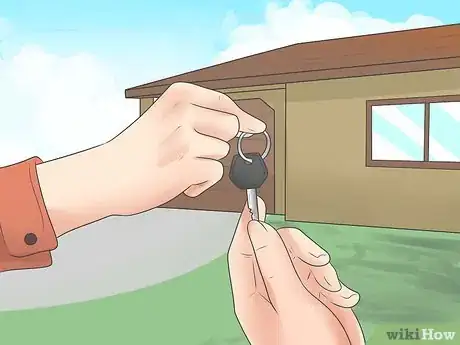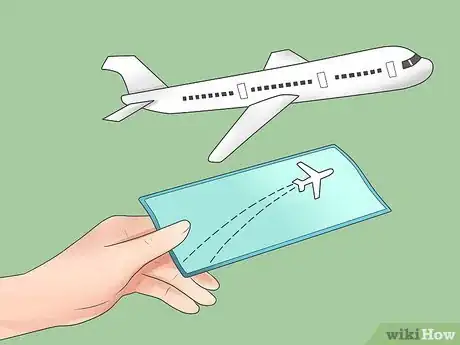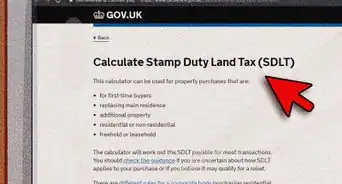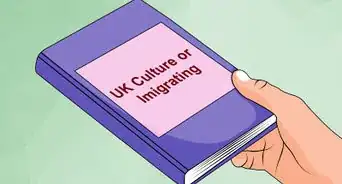wikiHow is a “wiki,” similar to Wikipedia, which means that many of our articles are co-written by multiple authors. To create this article, 21 people, some anonymous, worked to edit and improve it over time.
There are 12 references cited in this article, which can be found at the bottom of the page.
wikiHow marks an article as reader-approved once it receives enough positive feedback. In this case, 100% of readers who voted found the article helpful, earning it our reader-approved status.
This article has been viewed 139,986 times.
Learn more...
Are you interested in moving to the beautiful country of Italy? It can be a great place to live, but moving is no small matter. Before you jump headlong into it you should understand the many steps you will have to take to make your dream a reality.
Steps
Learning About Italy
-
1Get to know the culture of Italy. Italy has rich history and traditions, and it would be a good idea to learn about them before deciding to make Italy your home
- Italy's culture has been influenced greatly by its diverse ties to the rest of the Mediterranean world, especially North Africa, Greece, and Spain.
- You should also understand that Italy is a very regionalized country. The unified Italian state was only formed in the latter half of the nineteenth century, and consequently there are tremendous regional differences within the country. Provincial subcultures are especially strong, and the broader divide between northern and southern Italians is a fact that many within the country remain particularly conscious of.[1]
-
2Learn the language. Many Italians can speak English, but it's useful to learn Italian as it is the official language of Italy.
- Understand that a language can provide great insights into the culture and traditional worldview of the people of a country. The way in which a people refer to themselves, their country, and its spaces and places can only properly be understood in the native language.
- Though many travelers only gain fluency in a language after moving to a country, you should begin the process of learning the language before you move to Italy. Build a foundation, and then add to it.
- While it is commonly claimed that grammar and sentence structure are the most important early components of a language to pick up, some research suggests that vocabulary is actually the key. Second-language learners simply have nothing to build upon without first gaining a basic vocabulary. Start with this, but pay attention to word order as you become more familiar with the vocabulary.[2]
Advertisement -
3Evaluate your opportunities in Italy. You are probably thinking about moving to Italy because you are convinced that there is some possibility of a higher quality of life there than where you currently live. While possibilities do abound in Italy, it is not a guarantee that everyone can find the right place to live or the best means to make a living.
- The Italian economy has not rebounded well from the economic crisis of 2008, and there remains a high level of unemployment. Young people in particular struggle to find work--36% of workers under 25 are unemployed. The situation does not seem likely to improve in the near future in part due to a government that is frequently stuck in gridlock.[3]
- Though it may seem like a stereotype, Italy has had greater struggles with the crime problem than nearly any other country in western Europe. Non-violent crimes (such as pick-pocketing) are very common in major tourist cities. More sinister organized criminal syndicates are also influential in much of the country (especially southern Italy), and have on occasion even assassinated politicians and police chiefs in order to protect their interests in narcotics trafficking.[4] [5]
-
4Visit Italy (if you have not already done so). If you intend to spend months or years in Italy, you really should see the country before you commit yourself to the move.
- You must select a place of residency, and this is your opportunity to investigate the many cities of Italy. Get to know a potential hometown.
-
5Make your decision. With the knowledge you now have of Italy, you can make an intelligent decision to move (or not move) to Italy.
Getting a Visa
-
1Understand Italy's immigration and residency laws. A visit of ninety days or fewer requires no special permit or visa for American citizens or citizens of the EU countries. All extended visits do require a visa or permit. Like those of many other developed nations, the immigration and residency laws of Italy were primarily authored by opponents of immigration. For that reason, it can be quite difficult to establish legal residency in Italy. You need to understand all of the options available before you move.
- Student visas are among the easiest to obtain--provided you had no difficulty gaining acceptance to a program in Italy. Many programs specifically target students from overseas. For young people who want to spend an extended period of time in Italy this is probably the best option available. If you are already studying at a college or university, contact their study abroad program to see if there are opportunities available with schools in Italy. If you have not yet entered post-secondary education, you can look for Italian universities or American schools with programs in Italy.
- Work visas are among the hardest to obtain. These are further subcategorized into artist visas, dependent worker visas (for employees), and independent worker visas (for freelancers and other independent contractors). The independent worker visas are especially hard to obtain, but those seeking dependent worker visas are caught in a bit of a catch-22--it is difficult to get a job without a visa, but you cannot obtain a visa without a job.
- Residency visas require that you can demonstrate that you possess enough wealth to support yourself while in Italy. However, because it is not a worker visa, that wealth cannot come from income based on employment inside of Italy.
-
2Compile the necessary documentation. In order to obtain the visa, you must be able to prove that you have the status that fits one of the above profiles. Here are a few things that you may need:
- A valid passport issued by the country of which you are a citizen. A green card or proof of residency in another country is inadequate.
- A letter of acceptance from the college or university you will be attending (if applicable).
- Bank documents proving that you are in possession of the money that you claim (if you are applying for the residency visa).
-
3Obtain the appropriate visa or permit from an embassy or consulate. The documents that you must provide differ based on your nationality and country of residency.
- You must arrange an embassy or consulate appointment weeks in advance.
- During the visa interview, you will be asked a number of questions about the length of your intended stay, your purpose, and your background. Really, they need to confirm three things: 1. That you are not going to perpetrate any crimes while in Italy; 2. That you will not become a burden on the social welfare system; 3. That it is not your intent to immigrate permanently. While there are some--such as fabulously rich investors--who are encouraged to immigrate on a permanent basis, in the majority of cases the authorities are told to discourage anyone who has the intent to make Italy their permanent home.
- Though you may be approved on the spot, you may also be told that a further background check will be required. They will then perform a thorough check to confirm the authenticity of your claims and verify your stated plans.
-
4Receive your visa. The approval process can take weeks, and approval is never guaranteed. Understand, then, that an appointment scheduled just before your move may not be a good idea.
- Check the visa to make sure the details listed on it are accurate. Errors could complicate the process and result in a forced departure from Italy.
Making the Move
-
1Rent or buy a property. You must find a place a reside. Even if you plan to move to Italy for the long term, it may be a good idea to find an apartment at first, just so you can really get to know the country, the neighborhoods, and the housing market.
- If you made a trip to Italy earlier, hopefully you had some success while scouting around. That would have been a good time to compile a list of potential neighborhoods, apartment complexes, or residential agents that you can contact later.
- Until recently, rents were set by government agencies. Legal changes in the last few years have opened up housing prices to market shifts, and you may notice substantial price differences from one neighborhood to the next.[6]
- City centers, as you might expect, remain the most expensive areas to live. Some of the larger cities have highly capable public transportation, so you want to factor that in when you are selecting a house or apartment.[7]
-
2Set up basic utilities and services. You will need electricity, water, possibly gas, and phone service in Italy. The process is little different from doing so in the United States, but there are a few things you can do to simplify it.
- If you already have a cell phone, get a European sim card. You will need an "unlocked" phone, but with the right sim card your phone will be identified as European by local networks and you will have access to regional cell phone rates (as long as you find a carrier).[8]
- Though you will have to make arrangements with a local water company, you will probably not be billed regularly. Each household has a water quota and, outside of the subscription fee, you are only charged for exceeding that quota. If you are always under the quota, expect just a two to four bills from them a year.[9]
- You are free to choose which electrical utility you want to use (at least if you purchased or are renting an entire house). The regular quantity of electricity apportioned for each household is smaller than is the case in the United States, and if you need additional power you may have to ask for a higher volume. You will be charged at a higher rate if you do so.[10]
-
3Book your method of transportation to Italy. The decision of plan, train, or automobile should be based upon the relative cost of each and your current distance from Italy.
- The cost of flights is largely based upon the amount of time between the time of purchase and the flight and the amount of demand for tickets at that departure time. Purchase early or for flights during a slow season to get the best deals.
-
4Pack your bags. Bring everything that you will need in the short term. Essentials here are items like clothes and toiletries to get you started. A language dictionary is also a must if you are still learning the language.
-
5Pack certain belongings and ship them to your new home. Even if you think this move to Italy is for the long term, it may not be practical to ship all of your current possessions there. If you live in the Americas, for example, the transhipment cost would be prohibitive for all but the most valuable of items. Bulky but relatively inexpensive items (such as common furniture) should be left behind and replacements will have to be purchased in Italy.
-
6Convert your currency into Euros. Obviously, you can skip this step if you live in a country where the Euro is already the national currency. Remember, the more money that you bring, the better start that you will get in Italy.
- Calculate the value of your money in Euros. The exchange rate changes frequently, and exchanging your currency at a time when your nation's currency is weak in comparison to the Euro could actually cost you a substantial portion of your wealth.
- You can exchange your currency at certain banks or at offices in the airports. Of course, since this is a trip planned well in advance, there is no reason to wait until you are in the airport to do it. Check with your bank to see if they offer these services and, if so, how much they charge for them.[11] [12]
-
7Use your chosen method of transport to get to Italy.
- Keep your passport on hand the entire time. Do not place it in checked luggage. You will be asked for it as you board a plane or ship bound for Europe. If you do not have it, you can be denied boarding.
Printable Phrase Guides
Community Q&A
-
QuestionIs speaking Italian mandatory when living in Italy?
 Community AnswerNo, it isn't. However, it will make things a lot easier for you and for the people you're going to talk to.
Community AnswerNo, it isn't. However, it will make things a lot easier for you and for the people you're going to talk to. -
QuestionHow do I get prescription medication in Italy?
 Stef7saCommunity AnswerIn Italy you should make sure to enter the national health service ASL, which will then assign you a home medic who can write the prescriptions you need.
Stef7saCommunity AnswerIn Italy you should make sure to enter the national health service ASL, which will then assign you a home medic who can write the prescriptions you need. -
QuestionI am retired. How much money will I need each year to live in Italy?
 Stef7saCommunity AnswerAlthough Italians earn much less than citizens of northern Europe, the cost of living is comparable: food, gas, electricity, water, rent, etc. are not cheaper. The one thing that is cheaper though (outside of the major cities) is eating out.
Stef7saCommunity AnswerAlthough Italians earn much less than citizens of northern Europe, the cost of living is comparable: food, gas, electricity, water, rent, etc. are not cheaper. The one thing that is cheaper though (outside of the major cities) is eating out.
Things You'll Need
- Passport
- Money
- Tax Number or Codice Fiscale C.F.
References
- ↑ http://traveltips.usatoday.com/southern-italy-vs-northern-italy-109743.html
- ↑ https://books.google.com/books?id=2VCvBAAAQBAJ&pg=PT146&lpg=PT146&dq=foreign+language+vocabulary+syntax+grammar&source=bl&ots=kxJXEYgmom&sig=DLTHLjKyfk0PHSoO0D8dDXeffSA&hl=en&sa=X&ei=M7G2VJ3SBeXLsATC1YGoDQ&ved=0CFsQ6AEwBw#v=onepage&q=foreign%20language%20vocabulary%20syntax%20grammar&f=false
- ↑ http://www.theguardian.com/world/2013/feb/20/six-things-wrong-with-italy
- ↑ http://www.thecommentator.com/article/4659/dining_out_italy_s_mafia_problem
- ↑ https://www.osac.gov/pages/ContentReportDetails.aspx?cid=13969
- ↑ http://italy.angloinfo.com/housing/renting-accommodation/
- ↑ http://www.virtualtourist.com/travel/Europe/Italy/Transportation-Italy-TG-C-1.html
- ↑ http://www.summerinitaly.com/traveltips/how-to-get-affordable-cell-phone-service-for-italy
- ↑ http://italy.angloinfo.com/housing/setting-up-home/water/
About This Article
Before you move to Italy, keep in mind that there's a high level of unemployment there, so you'll want to make sure you have a job secured or enough money saved up to support yourself. Also, try to visit Italy before moving there so you can scope out different cities and figure out where you want to live. To move to Italy, you'll need to obtain a student visa, work visa, or residency visa so you can stay for an extended period of time. Once you've obtained a visa, you can start looking for a place to live and preparing for your move! To learn how to obtain a visa to live in Italy, scroll down!











































































